|
|
||

|
||
|
|
||
|
|
||
|
|
||
|
|
||
|
|
||
Sjoerd Kooistra
Died in Ubbergen on June 27, 2010 (59 yrs)
Sjoerd Kooistra was the biggest bar-owner of the Netherlands, and also owner of all big gay venues in Reguliersdwarsstraat.
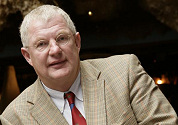 Sjoerd Kooistra was born in Groningen, but moved to Norg, a little country village in Drenthe, where his father had bought a restaurant with a small holiday resort. At the age of 14 he had to stop school and started working for his father. When his father died in 1965, Sjoerd took over the business of his father when he was only 21 years old. A few years later he moved to Groningen, where he bought his first own bar: Bommen Berend.
Sjoerd Kooistra was born in Groningen, but moved to Norg, a little country village in Drenthe, where his father had bought a restaurant with a small holiday resort. At the age of 14 he had to stop school and started working for his father. When his father died in 1965, Sjoerd took over the business of his father when he was only 21 years old. A few years later he moved to Groningen, where he bought his first own bar: Bommen Berend. After a few years he was the owner of a series of popular bars at Grote Markt, the central square of Groningen. Rapidly he bought one bar, club or restaurant after another and this made Sjoerd Kooistra the biggest bar-owner of the Netherlands. In 2010 he owned over 50 venues spreaded all over the country. This also made him one of the richest gay people from the Netherlands.
In 1984 Kooistra bought his first bar in Amsterdam: the trendy Oblomow bar at Reguliersdwarsstraat nr. 40. Two years later he took over the famous gay bar April and gay coffeeshop Downtown. In 1988 he opened gay disco (April's) Exit and in 1996 he took over the once famous disco "36 op de schaal van Richter", which he turned into gay pub Soho in 1999 - at that time the most trendy and popular gay bar of Amsterdam.
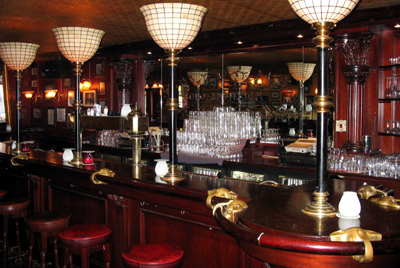
The bar upstairs at Pub Soho as an example
of the typical style of "De Drie Gezusters"
The English/American styled interior of Soho has become the trade-mark of Sjoerd Kooistra, who personally invents such concepts in full detail. Together with the rotating bar of April, this style has been implemented in a lot of bars around the country. These bars are all called "De Drie Gezusters" or "The Three Sisters", named after the first bar of this kind in Kooistra's hometown Groningen.
Because more and more of his bars have this same style of interior, Kooistra is often criticised for making too many venues without a soul. On the other hand, his concept is still very popular, and many of his bars are the biggest in the Netherlands.
In 1998 Sjoerd Kooistra bought the popular gay dancing Havana in Reguliersdwarsstraat, but he closed it down for financial reasons in 2002. In that same year two other people opened the highly trendy gay bar ARC, but by the end of 2007 Kooistra took over this bar too. Since then he was again the sole owner of all big gay venues in the western part of Reguliersdwarsstraat.
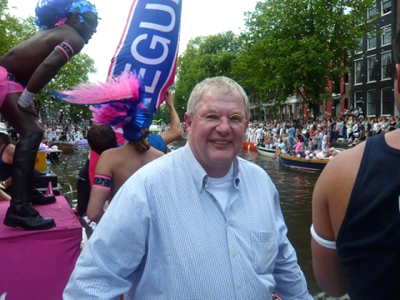
Sjoerd Kooistra aboard the boat of his bars in Reguliersdwarsstraat
during the Canal Parade of the Amsterdam Gay Pride 2008
(foto: www.gayplaces.nl)
Kooistra managed all his businesses through a complicated structure of holdings and tenants. On top is the main holding company called Plassania Beheer BV. At a lower level there are a number of smaller holdings. These are the sole stakeholders of a variety of small corporations led by a tenant (pachter). This tenant rents the concept, name and inventory directly from Plassania and is the actual manager of the various bars.
The venues in Reguliersdwarsstraat are run by the tenant who is director of Reguliers BV. This company is owned by Gouden Kooi BV, which is owned by a niece of Sjoerd Kooistra. The buildings of 41 bars are seperatly rented from the Heineken Company. This brewery rents them from Plassania so they can be sure the bars will only sell Heineken beer.
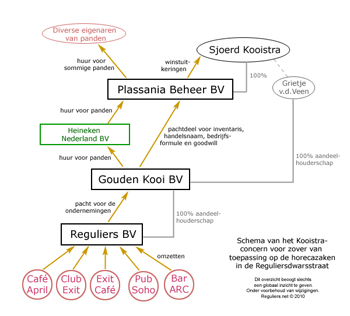
Structure of the Kooistra-company, as far as the venues
in Reguliersdwarsstraat are concerned (in Dutch)
- click for a bigger picture -
In 2003 the tenants of 18 bars from the Kooistra-company went broke. Almost none of the bars were closed, but many bills stayed unpaid because there where no assests left. This led to several inquieries into possible bankruptcy-fraud, but in the end Sjoerd Kooistra wasn't charged. Pressed by the Amsterdam city government he only changed the structure of his lower level corporations.
By the end of 2009 some serious problems with the Heineken Brewery started. They claimed the rent wasn't paid for almost a year, went to court and won. With a court order Heineken closed Club Exit and the Exit Cafe in Reguliersdwarsstraat on April 6th, and on May 19th even the front part of the world famous gay bar April was closed. Due to a missing signature on a contract, the back part could stay open!
In the meanwhile Kooistra and his companies still didn't pay the rent, so Heineken went to court again asking the right to close even more bars. A court sentence for 8 bars, including gay pub Soho in Reguliersdwarsstraat, which was one of Kooistra's favourite bars, was expected on Monday, June 28, 2010.
The court sentence was delayed by one day, but Sjoerd Kooistra would never hear the ruling. On Monday-evening he was found dead by his driver at his residence in Ubbergen, near the city of Nijmegen.
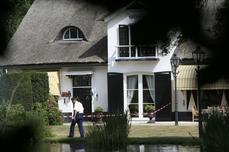
The residence of Sjoerd Kooistra
during the police investigation
A big crime-scene investigation was set up, but before the results, the lawyer and good friend of Kooistra, Oscar Hammerstein, said he committed suicide because of the conflict with Heineken. Family-members of Sjoerd Kooistra couldn't believe this, but two days later the police confirmed his death was caused by suicide.
This unexpected and dramatic death of Sjoerd Kooistra was a great shock for so many people who regularly visit his bars. Especially there was a great fear for the future of his venues in Reguliersdwarsstraat, as they are the heart of the Amsterdam gay scene.
In the year following the death of mr. Kooistra new owners were found for most of his bars and his real estate.
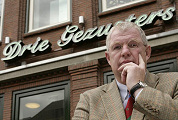
Links
- Interview about the biography of Sjoerd Kooistra
(A full biography of Sjoerd Kooistra is also available in Dutch on this website)










